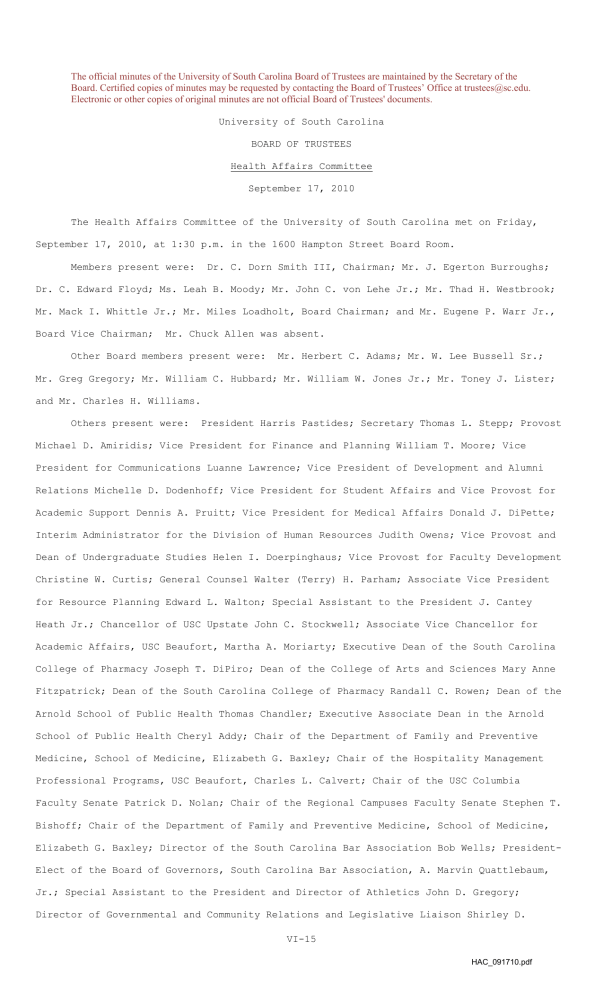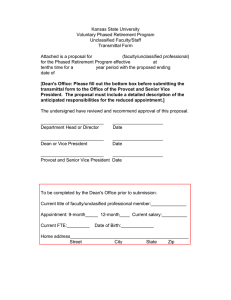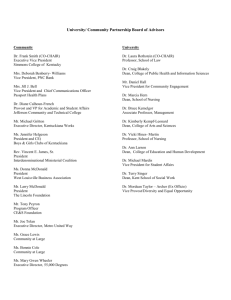Document 14163011

The official minutes of the University of South Carolina Board of Trustees are maintained by the Secretary of the
Board. Certified copies of minutes may be requested by contacting the Board of Trustees’ Office at trustees@sc.edu.
Electronic or other copies of original minutes are not official Board of Trustees' documents.
University of South Carolina
BOARD OF TRUSTEES
Health Affairs Committee
September 17, 2010
The Health Affairs Committee of the University of South Carolina met on Friday,
September 17, 2010, at 1:30 p.m. in the 1600 Hampton Street Board Room.
Members present were: Dr. C. Dorn Smith III, Chairman; Mr. J. Egerton Burroughs;
Dr. C. Edward Floyd; Ms. Leah B. Moody; Mr. John C. von Lehe Jr.; Mr. Thad H. Westbrook;
Mr. Mack I. Whittle Jr.; Mr. Miles Loadholt, Board Chairman; and Mr. Eugene P. Warr Jr.,
Board Vice Chairman; Mr. Chuck Allen was absent.
Other Board members present were: Mr. Herbert C. Adams; Mr. W. Lee Bussell Sr.;
Mr. Greg Gregory; Mr. William C. Hubbard; Mr. William W. Jones Jr.; Mr. Toney J. Lister; and Mr. Charles H. Williams.
Others present were: President Harris Pastides; Secretary Thomas L. Stepp; Provost
Michael D. Amiridis; Vice President for Finance and Planning William T. Moore; Vice
President for Communications Luanne Lawrence; Vice President of Development and Alumni
Relations Michelle D. Dodenhoff; Vice President for Student Affairs and Vice Provost for
Academic Support Dennis A. Pruitt; Vice President for Medical Affairs Donald J. DiPette;
Interim Administrator for the Division of Human Resources Judith Owens; Vice Provost and
Dean of Undergraduate Studies Helen I. Doerpinghaus; Vice Provost for Faculty Development
Christine W. Curtis; General Counsel Walter (Terry) H. Parham; Associate Vice President for Resource Planning Edward L. Walton; Special Assistant to the President J. Cantey
Heath Jr.; Chancellor of USC Upstate John C. Stockwell; Associate Vice Chancellor for
Academic Affairs, USC Beaufort, Martha A. Moriarty; Executive Dean of the South Carolina
College of Pharmacy Joseph T. DiPiro; Dean of the College of Arts and Sciences Mary Anne
Fitzpatrick; Dean of the South Carolina College of Pharmacy Randall C. Rowen; Dean of the
Arnold School of Public Health Thomas Chandler; Executive Associate Dean in the Arnold
School of Public Health Cheryl Addy; Chair of the Department of Family and Preventive
Medicine, School of Medicine, Elizabeth G. Baxley; Chair of the Hospitality Management
Professional Programs, USC Beaufort, Charles L. Calvert; Chair of the USC Columbia
Faculty Senate Patrick D. Nolan; Chair of the Regional Campuses Faculty Senate Stephen T.
Bishoff; Chair of the Department of Family and Preventive Medicine, School of Medicine,
Elizabeth G. Baxley; Director of the South Carolina Bar Association Bob Wells; President-
Elect of the Board of Governors, South Carolina Bar Association, A. Marvin Quattlebaum,
Jr.; Special Assistant to the President and Director of Athletics John D. Gregory;
Director of Governmental and Community Relations and Legislative Liaison Shirley D.
VI-15
HAC_091710.pdf
Mills; Associate Director of Governmental Affairs and Legislative Liaison Casey Martin;
Director of Media Relations, Office of Communications, Margaret Lamb; University
Technology Services Production Manager, Justin Johnson; and Board staff members Terri
Saxon, Vera Stone, and Karen Tweedy.
Chairman Smith called the meeting to order, welcomed those present, asked everyone to introduce themselves. Ms. Lamb indicated that no members of the media were in attendance.
Chairman Smith stated that the agenda had been posted and the press had been notified as required by the Freedom of Information Act; the agenda had been e-mailed to the Committee members; and a quorum was present to conduct business.
Chairman Smith stated that there were contractual matters which were appropriate for discussion in Executive Session.
Mr. von Lehe moved to enter Executive Session. Ms. Moody seconded the motion. The vote was taken and the motion carried.
The following persons were invited to remain: President Pastides, Secretary Stepp,
Dr. Amiridis, Dr. Moore, Ms. Owens, Dr. Pruitt, Ms. Lawrence, Dr. DiPette, Mr. Parham,
Mr. Heath, Mr. Walton, Dr. Curtis, Dr. Doerpinghaus, Mr. Gregory, Mrs. Martin, Ms. Mills, and Ms. Lamb.
VI-16
HAC_091710.pdf
Return to Open Session
I. Introduction and Report from Vice Provost for Health Sciences: Chairman
Smith called on Provost Amiridis who explained that the deans of the five health sciences colleges had been asked to select a representative from among them to hold the title of
“Vice Provost for Health Sciences” and to be the liaison between the Office of the
Provost and those colleges; this appointment would extend for one year. Currently, Dr.
Tom Chandler, Dean of the Arnold School of Public Health, held that title. He had been asked to present a report to the committee which highlighted the major accomplishments of the past year and the challenges for the coming year of these colleges.
Dean Chandler remarked that the five health sciences colleges included the College of Social Work; College of Nursing; School of Medicine; South Carolina College of
Pharmacy; and the Arnold School of Public Health.
He explained that these colleges had been able to maintain an outstanding level of research dollars. Current fiscal year research growth was quite good.
Despite many of the budget issues, student growth was characterized as “quite remarkable” across the colleges. Total students for the health sciences colleges numbered 2017 undergraduate students and 1863 graduate students, a fairly even distribution. These colleges contributed extensively to the University’s doctoral education which helped to maintain and improve the Carnegie I Research rankings.
The South Carolina College of Pharmacy had achieved full accreditation last year; hired a Center of Economic Excellence (CoEE) Chair in Medication Safety from Northwestern
University in Evanston, Illinois; and created the Kennedy Pharmacy Innovation Center (K-
PIC) from a $30 million gift which will provide “great things” for the college. The alumni donors, William and Lou Kennedy, had been recognized in a special ceremony earlier today. The college had experienced a 10 percent increase in National Institutes of
Health (NIH) funding last year which was quite an accomplishment for a relatively small school and hired 7 new faculty members.
Recently, the South Carolina College of Pharmacy had been featured on The New York
Times front page. The article discussed two graduates working at a pharmacy in Augusta,
GA who were essentially providing one-on-one consultation to promote physical activity as a way to promote health.
Challenges for the coming year for the college included adjusting for state budget cuts; creating a common tenure and promotion policy for a combined college; growing the research and graduate programs; improving technology for distance education and implementing the PharmD program at the Greenville Hospital System.
During the past year, the College of Nursing had experienced robust enrollments across all programs with more than 1200 students; created a state-of-the-art patient simulation lab with robotic patients; created a very sophisticated on-line distance
VI-17
HAC_091710.pdf
course delivery system; graduated the first BSN students from USC Salkehatchie and USC
Lancaster; and retained a very young and talented group of faculty members. Dean
Chandler reminded the committee that approximately 9-10 full time faculty were serving
1200 students. In addition, the College of Nursing garnered $1.4 million in extramural funding.
The College of Nursing had been featured in a number of interesting article in the press including the story of a high tech “manikin,” a realistic medical simulator that breathed, had a pulse, blinked his eyes and, with the aid of instructors using microphones, talked. The college also launched a “drive through” flu shot program in the spring which was largely free for faculty, staff and students.
Challenges for the coming year include: faculty and staff reward and retention; large numbers of required clinical faculty; expansion of the simulation lab to absorb higher percentage of undergrad clinical demands; on-line course development and additions; promotion of additional research faculty positions and support to grow the research agenda.
The College of Social Work was able to recruit Dr. Sue Levkoff from Harvard Medical
School as the CoEE SeniorSmart “SmartHOME™” endowed chair. Faculty research for the past year totaled $3.3 million from NIH; $600,000 from the Kresge Foundation; and $484,873 from the U.S. Department of Justice. The college had also experienced a 26 percent increase in student credit hour production with the MSW program expansion into Greenville and Charleston and the kickoff of a new BSW program (68 majors so far).
Dean Chandler reported that Anton Gunn, a graduate of the college, was appointed by
Kathleen Sebelius, U.S. Department of Health and Human Services Secretary, as regional director for that department.
Challenges for the upcoming year included: filling new faculty positions to accommodate growth and to meet accreditation standards; improving distance education infrastructure to remain competitive in regional and national markets; and acquiring research and classroom facilities to accommodate faculty and student growth.
The School of Medicine was pleased to announce that Family and Preventive Medicine had been designated the first primary care practice in South Carolina as a Level III
Patient-Centered Medical Home (the future of healthcare delivery); the School of Medicine had a national model program. Dean Chandler explained that a medical home was a new approach to primary care in which a patient was assigned a primary physician who essentially remained with that individual throughout their medical career.
The School of Medicine also operated the largest integrated health care group in the Midlands – more than 150 physicians in 10 clinical departments provided care to
175,00 South Carolinians each year.
VI-18
HAC_091710.pdf
It also led the nation in ultrasound education. The school will host the First
World Congress on Ultrasound Medical Education in April 2011 which will focus on “pocket” ultrasound (the stethoscope of the 21 st century).
In response to the 2010 Association of American Medical Colleges questionnaire distributed to graduates, 98.7 percent of the School of Medicine Class of 2010 reported they were satisfied with their overall medical education (the national average was 87.4 percent).
In the area of research, during the past 5 years, extramural research funding had increased from $21 million to $42 million; NIH funding had increased from $5 million to
10 million.
Trauma surgeon Steve Fann and basic scientist Mike Yost had patented a synthetic blood replacement called Resuscinex that stabilized victims of severe blood loss which could save lives on battlefields and in other hemorrhagic trauma.
A major challenge for the coming year involved shrinking state support - the School of Medicine had lost over $10 million recurring state appropriations since 2008. In addition, the school must face adjustments to and use of Healthcare Reform changes to its advantage with a new emphasis on primary care, quality and safety of care, patientcentered medical homes, integrated care and innovation in healthcare.
Finally, Dean Chandler addressed the Arnold School of Public Health. He noted that the school was recently re-accredited by the Council on Education for Public Health for a full 7-year term; experiencing record graduate and undergraduate enrollments (40 percent and 120 percent respectively since 2006); met the donor match for 3 CoEE’s in Health
Lifestyles , Nano & Health , and Orthopedic Outcomes ; $54 million in extramural research funding for FY 09-10, $23.5 million for FY 2011 since July 1 st .
Dean Chandler also referenced two press articles featuring Arnold School of Public
Health faculty.
Like the other health sciences colleges, challenges for the coming year centered on budget issues. He noted that they hoped to fully fund the prostate cancer disparities
CoEE.
Faculty retention was a big issue in all of the colleges. Dean Chandler characterized market pressures as “extreme” in health sciences. Currently the school was seeking individuals to support their strengths in the areas of physical activity, nutrition and health.
Lastly, they were planning to move from their current location to the new Discovery
I building.
II. Adjournment: Since there were no other matters to come before the
Committee, Chairman Smith declared the meeting adjourned at 2:35 p.m.
Respectfully submitted,
VI-19
HAC_091710.pdf
Thomas L. Stepp
Secretary
VI-20
HAC_091710.pdf


